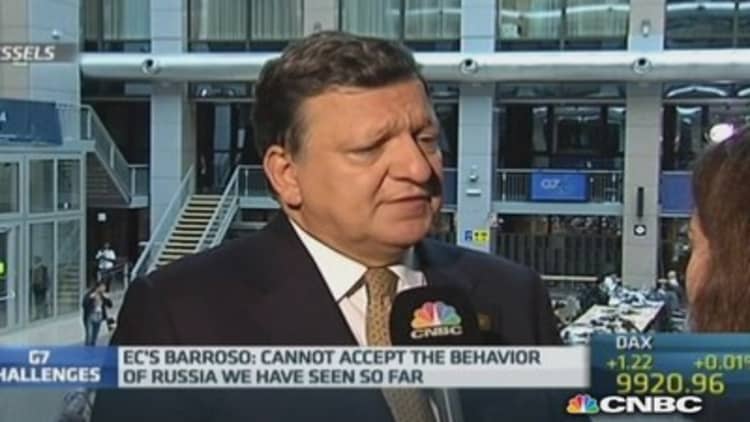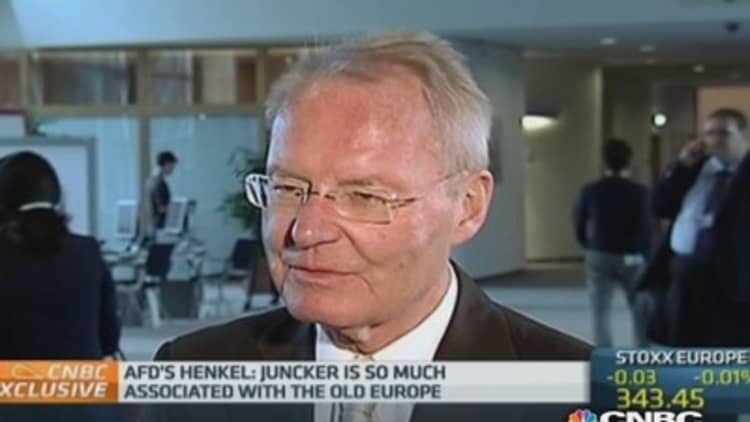
José Manuel Barroso, the outgoing president of the European Commission, has told CNBC there is unanimous agreement among Europe's leaders to step up sanctions on Russia if the crisis with Ukraine escalates.
Speaking at a meeting of the G-7 group of leading industrialized economics - the G-8 minus Russia - in Brussels, Barroso said the group's message to Russia and Ukraine was "loud and clear".
"We stand by Ukraine. We want this country to be a viable, independent, democratic and hopefully prosperous country. We cannot accept the kind of behavior that so far has been the behavior of Russia," he told CNBC.
It is the first time in 17 years that Russia has not attended the G-7 meeting. Britain, Canada, France, Germany, Italy, Japan and the U.S. voted to have the country removed from the G-8 because of its aggression towards Ukraine.
Read MoreG-7 powers meet without Russia in summit snub over Ukraine
Ukraine has remained on a knife-edge since the overthrow of the pro-Russian president Viktor Yanukovych in February. In early March, Russia annexed Crimea in the south of the country and since then there has been fighting between pro-Russian militias and Ukrainian forces in the country's industrial heartland in the east.
Barroso said Europe prioritized a de-escalation of the conflict over confrontation, but added: "If de-escalation does not happen and if Russia prefers confrontation, then additional measures will be taken."
Russia's aggression has led both the U.S. and the European Union (EU) to hit it with an escalating series of sanctions. These include visa bans and asset freezes on companies and officials in both Ukraine and Russia with links to President Vladimir Putin.
Read More
These sanctions had already been "quite effective," according to Barroso, but he stressed that Europe's leaders had agreed unanimously to step up the sanctions if the conflict continues to escalate because of Russia.
Russia is facing recession in the first six months of 2014, after gross domestic product (GDP) shrunk by 0.5 percent in the first quarter on the previous three months. Economists have slashed their forecasts for the year from slow growth to near stagnation.
"To a large extent (this is) because of the pressure we took collectively by the international partners. Because investors are now very doubtful about the perspectives of stable investment in the country with this conflict situation," Barroso added.
Read MoreEurope's hunger games: Who'll take the EU's top job?
Matthew Clements, an analyst IHS Country Risk, warned that intensified Western sanctions could also have serious political implications.
"Russia's economy is highly likely to rapidly enter a downturn if sectoral sanctions are introduced; such a downturn around the time of gubernatorial elections could trigger mass unrest and the popular rejection of candidates favored by the Kremlin," he said in a note.
"These dynamics also suggest that Moscow is still keeping all of its options open in Ukraine – hence the need to prepare for wide-ranging Western sanctions," he added.
Who will take Barroso's job?
Barroso's term as the head of the European Commission is due to end on October 2014, and discussions as to his successor are already underway.
Front-runners for the job include former eurogroup President Jean-Claude Juncker, European Parliament President Martin Schulz and former Belgian Prime Minister Guy Vershofstadt.

The position carries significant clout, playing a critical internal role and also influencing foreign policy by attending meetings such as the G-7.
Usually, the president is simply nominated by EU member states, but this year, for the first time, the countries will have to take into consideration the results of the parliamentary elections.
Earlier on Wednesday, German Chancellor Angela Merkel said she was backing Juncker as the next president of the European Commission. But Hans-Olaf Henkel, MEP-Elect at the Alternative for Germany party, said he disapproved of Juncker because he is "too much associated with the old Europe."
"He has been responsible for the mismanagement of the euro," Henkel told CNBC. Instead, he said the European Commission should look east for a new president.
Barroso added that the decision about his successor was the responsibility of the European Council President, Herman Van Rompuy, "so let him do his job and see what is the solution."
"After all, it's not so difficult to find someone to replace me," he added.


